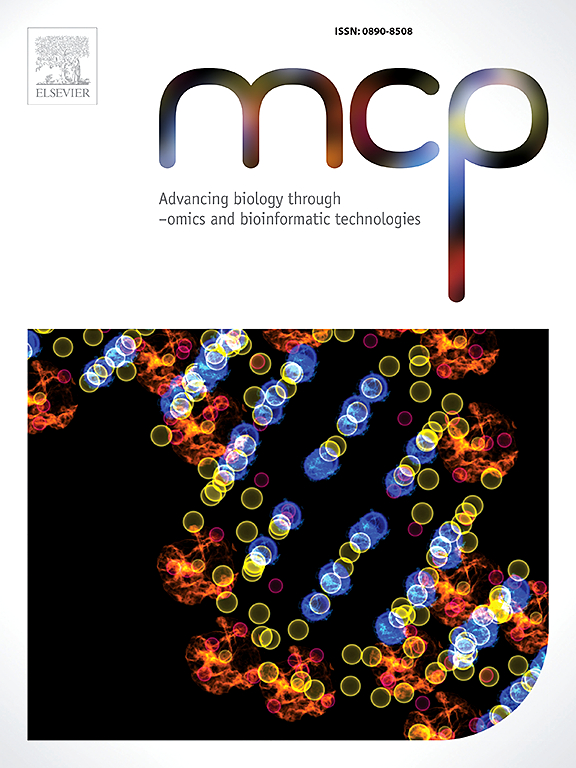The activation of SYNJ2/GRB2 axis accelerates the malignant metastasis and angiogenesis of gastric cancer cells
IF 2.3
3区 生物学
Q3 BIOCHEMICAL RESEARCH METHODS
引用次数: 0
Abstract
In gastric cancer (GC), tumor cell metastasis to lymph node may occur, and can be impacted by synaptojanin 2 (SYNJ2). Herein, we explored the mechanism of SYNJ2 in the progress of GC. SYNJ2 level in GC tissues was predicted by GEPIA database. After GC cells were transfected with short hairpin RNA against SYNJ2 (shSYNJ2), shGRB2, SYNJ2 overexpression plasmid and growth factor receptor-bound protein 2 (GRB2) overexpression plasmid, the mRNA levels of SYNJ2 and GRB2 in GC cells were quantified by qRT-PCR. CCK-8, flow cytometry, wound healing, transwell and tube formation assays were performed for detecting viability, apoptosis, migration, invasion and angiogenesis of GC cells. Protein levels of GRB2, vascular endothelial growth factor (VEGF), E-Cadherin, N-Cadherin and Vimentin in GC cells were measured by Western blot. The relationship between SYNJ2 and GRB2 was assessed by Co-immunoprecipitation (CO-IP) assay. SYNJ2 was highly expressed in GC tissues and cells. SYNJ2 overexpression promoted viability, migration, invasion, angiogenesis and GRB2 level, and inhibited apoptosis of GC cells, while shSYNJ2 exhibited opposite effects. GRB2 overexpression boosted yet shGRB2 suppressed cell migration, invasion and angiogenesis. Notably, SYNJ2 could interact with GRB2. GRB2 overexpression and shGRB2 reversed the effects of shSYNJ2 and overexpressed SYNJ2 on cell migration, invasion and angiogenesis and levels of metastasis-related proteins, respectively. In conclusion, SYNJ2 promotes GC cell metastasis and angiogenesis by up-regulating GRB2.
SYNJ2/GRB2轴的激活加速了胃癌细胞的恶性转移和血管生成。
胃癌(GC)可能会发生肿瘤细胞向淋巴结的转移,而淋巴结转移可能会受到突触素2(SYNJ2)的影响。在此,我们探讨了SYNJ2在胃癌进展过程中的作用机制。我们通过 GEPIA 数据库预测了 GC 组织中 SYNJ2 的水平。用针对SYNJ2的短发夹RNA(shSYNJ2)、shGRB2、SYNJ2过表达质粒和GRB2过表达质粒转染GC细胞后,通过qRT-PCR定量检测GC细胞中SYNJ2和生长因子受体结合蛋白2(GRB2)的mRNA水平。通过 CCK-8、流式细胞术、伤口愈合、transwell 和试管形成试验检测 GC 细胞的活力、凋亡、迁移、侵袭和血管生成。通过 Western 印迹法测定了 GC 细胞中 GRB2、血管内皮生长因子(VEGF)、E-Cadherin、N-Cadherin 和 Vimentin 的蛋白水平。SYNJ2和GRB2之间的关系通过共免疫沉淀(CO-IP)法进行了评估。SYNJ2在GC组织和细胞中高表达。SYNJ2过表达可促进GC细胞的活力、迁移、侵袭、血管生成和GRB2水平,并抑制细胞凋亡,而shSYNJ2则表现出相反的作用。过表达 GRB2 会促进细胞迁移、侵袭和血管生成,而 shSYNJ2 则会抑制细胞迁移、侵袭和血管生成。值得注意的是,SYNJ2 可以与 GRB2 相互作用。过表达 GRB2 和 shGRB2 分别逆转了 shSYNJ2 和过表达 SYNJ2 对细胞迁移、侵袭和血管生成以及转移相关蛋白水平的影响。总之,SYNJ2通过上调GRB2促进GC细胞转移和血管生成。
本文章由计算机程序翻译,如有差异,请以英文原文为准。
求助全文
约1分钟内获得全文
求助全文
来源期刊

Molecular and Cellular Probes
生物-生化研究方法
CiteScore
6.80
自引率
0.00%
发文量
52
审稿时长
16 days
期刊介绍:
MCP - Advancing biology through–omics and bioinformatic technologies wants to capture outcomes from the current revolution in molecular technologies and sciences. The journal has broadened its scope and embraces any high quality research papers, reviews and opinions in areas including, but not limited to, molecular biology, cell biology, biochemistry, immunology, physiology, epidemiology, ecology, virology, microbiology, parasitology, genetics, evolutionary biology, genomics (including metagenomics), bioinformatics, proteomics, metabolomics, glycomics, and lipidomics. Submissions with a technology-driven focus on understanding normal biological or disease processes as well as conceptual advances and paradigm shifts are particularly encouraged. The Editors welcome fundamental or applied research areas; pre-submission enquiries about advanced draft manuscripts are welcomed. Top quality research and manuscripts will be fast-tracked.
 求助内容:
求助内容: 应助结果提醒方式:
应助结果提醒方式:


